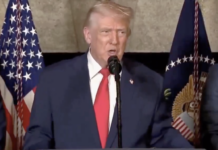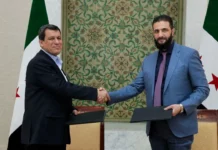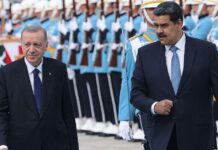Oral Çalışlar
The Turkish original of this article was published as Öcalan’la ilişkiler neden kesildi? on 4th July 2015.
The government has been blocking the contact traffic between Öcalan and the HDP for the last few months. As yesterday’s [3rd July] statement by the HDP’s İmralı delegation also notes, in the wake of the 10-point Dolmabahçe agreement reached between the government and HDP representatives on 28th February 2015, all ties connecting the two sides came to be broken.
A few days later, President Tayyip Erdoğan declared that he did not approve of this agreement.
And precisely at a point where we had become most optimistic about the Solution Process, all progress was suddenly terminated.
Has Öcalan been sacrificed to a strategy of escalating tension?
For the last four months and a half, we have had no sense of Öcalan’s take on various problems, or how he evaluates recent developments. All this time, some very harsh and constantly escalating polemics have been traded between the AKP government and the HDP. If it hadn’t bbeen for the MHP’s rejection, it might even have been possible to set up “a coalition for bringing the AKP to account.”
What is really curious is the embargo placed on Öcalan. During both the Gezi events and the 17-25 December operations, Öcalan had repeatedly cautioned HDP leaders, not in so many words but in effect, “not to go tailing after these.” His warnings had been heeded, and the HDP leadership had chosen to stand back from those events.
If we try to see things from the AKP side… Is it feasible to say that “if only Öcalan had been more active and able to intervene here and there, the HDP and the AKP might not have ended up in such extreme polarization”?
At this point the following possibility comes to mind: For their election strategy, the AKP policy-makers and the president appear to have opted for a line of escalating tensions with the HDP. Throughout their campaign, they kept hurling harsh polemics at the HDP. They may have estimated that such polarization might keep the HDP under the [10 percent] threshold.
As for the HDP leadership, it, too, based its campaign on trying to address and attract those social groups and circles already brimming with hatred for Erdoğan and the AKP. The slogan of “We are not going to allow you to become president [in a presidential system]” broke through many groups’ reservations about the HDP, enabling verdicts and reactions to change in its favor.
At the end of the day, increased tension and polarization helped not the AKP but the HDP. An election campaign that involved “sidelining” Öcalan and opting for an all-out “brawl” did not provide the AKP with what it had hoped to gain.
To judge by the last few weeks, the tense relationship between the AKP and the HDP has been carried over into the post-election period. Hence the isolation imposed on Öcalan.
Not the PYD but IS is the target
From what Ruşen Çakır wrote yesterday [3rd July], the government’s relations with the PYD appear to be following a course quite different from what the public has perceived so far.
In his article, Çakır argues that contrary to the conventional view that has been projected, Turkey’s border operations over the last few days have not been targeting the PYD but IS: “Speaking to a group of reporters, yesterday a top-level government official emphasized that ‘it is IS that is the root of the problem’ and that ‘the PYD is absolutely not being targeted.’ It appears that what Ankara is most anxious about is the IS expanding westward, overpowering the Free Syrian Army especially along the Mare-Jarablus line, thus triggering yet another wave of refugees; this is why all kinds of preventive measures are in the making. The same official stated that the possibility of the area between Afrin and Kobani coming under PYD control, that is to say the creation of a ‘Kurdish corridor’ running along Syria’s Turkish border, was not presently on the agenda. While the top-level government official in question described IS as ‘an incurable, dangerous terrorist organization,’ he spoke of the PYD as ‘a potentially rational actor.’”
This is how Ruşen Çakır wraps up his comments: “In conclusion, here are a few impressions of mine from a meeting that lasted nearly three hours: 1- Ankara is on the verge of adopting a first-ever position of explicit hostility to IS. 2- They are emphatic that there is no disagreement between the government and the Armed Forces. 3- Their assessment is that the Assad régime needs the PYD but the PYD is not equally dependent on Damascus. 4- Ankara is keeping all its PYD contact channels open. 5- Post-Tel Abyad headlines like ‘the PYD is more dangerous than IS’ have more to do with domestic political concerns than anything else.”
So yes, there does seem to be a serious divergence between perceptions and reality.
Under these circumstances, Öcalan, too, may have a positive impact on how that reality evolves.
But why is he being maintained in isolation? That I cannot understand.












